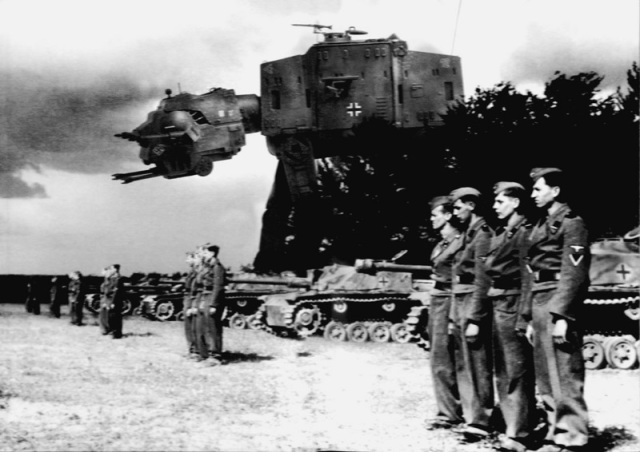
The Second World War has had a big effect on our collective cultural worldview. Even now, more than 70 years after it ended, a surprisingly large number of people are still obsessing over it and going over every last detail. Which is fine with me: I’ve always had an interest in history myself, especially military history, and I like to see people taking an interest in things that are older than their smartphone. I am a bit worried about the ways in which the war gets presented most of the time, though. Some important aspects get underemphasised, others get massively overemphasised, and this leads to an impression of the period which may make for great movies but doesn’t do much to reflect actual events. Perhaps as a result of this, recent years have seen a constant stream of people into discussions about history and a worryingly high percentage fall into a single category. You can identify them pretty easily: they’re the ones spouting some breathless and poorly-thought-out way in which the Nazis could have won, should have won, and would have won if only things went slightly differently. They’re so common that they have a special name.
And they really piss me off.
“From the Book of Revisionisms, the section on the Four Horsemen of the Wehrpocalypse:
And I saw, and beheld a white Schwalbe: and he that sat on it had a V2, and a Vampir was given unto him: and he went forth wundering, and to wunderwaffe.
And there went out another vehicle that was red, and a tank; and power was given to him that sat thereon to out-think the Allies at all turns, and by all means, that they should be encircled and destroyed; and there was given unto him immunity from logistical concerns.
And I heard the third vehicle cough, with a sound of honking. And I beheld, and lo a black barge; and he that sat on it had a sea-lion in his hand.
And I heard a voice in the midst of the four vehicles say, “A quart of turps for Allied soldiers, and three quarts for leaders; and do not damage the paint and the wine.” And I looked, and beheld a pale carrier: and his name that sat on it was Wank, and Screw followed with him. And power was given unto them over the mental capacity of the Allied Powers, to derp with paint, and with alcohol, and with blindness, and with the carriers of the Kriegsmarine.”
Yes, I know none of them are horsemen. That’s because the enthusiasts of the Wehrpocalypse like to pretend the German Army didn’t use horses very much. It doesn’t fit with the belief that…
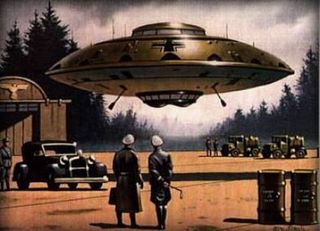
“German technology was superior!”
Talking about the various German projects that could go into this category would require a whole other article. But the short version is that this is what happens when you only look at numbers on a page and ignore the context something is used in. A lot of the German designs were impressive examples of engineering hubris, which in some cases excelled at a particular aspect but were usually very poor in others. At the end of the war they had theoretical designs – the “napkinwaffe” – which tend to make people very excited and claim the Nazi’s were this close to having stealth bombers, guided missiles, flying saucers and so on. But these things don’t mean what you might think.
For starters, everyone was coming up with theoretical designs that might win the war for them. In the field of British wonder-weapons, for example, sanity is represented by the Tallboy bomb and batshit-craziness by the Grand Panjandrum. And that’s just a tiny sample of what one nation was doing – once you start looking at what the Americans and the Russians were up to, you can see that plenty of creativity was being wasted invested in the field. And the Germans weren’t slacking either (although they might have been over-compensating). The difference is that the Germans lost, so we got to see all their secret weapons. Some of them look pretty futuristic… but that’s not the same as being practical.
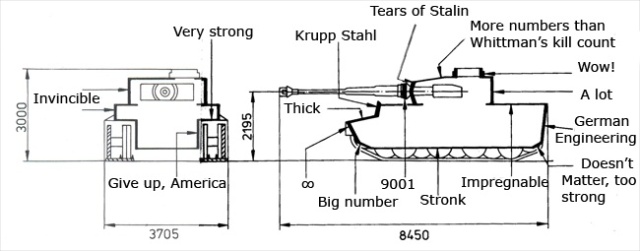
The truth is that most German designs were not that great. The most effective ones were generally comparable to those of other powers. But even they tended to be overly complex, unreliable, and very expensive. Most of the prototypes which people get excited over were poor to begin with, pushed even further from reality by the chronic shortages of strategic materials required for their construction. This meant the Germans never had enough of any of them. The Allies, on the other hand, generally managed to come up with designs that were considerably simpler to produce and maintain, but nevertheless performed just as well (fun fact: the T-34 was probably the best tank of the war, and as of 2014 was still in service in several countries).
But that doesn’t really matter, because…
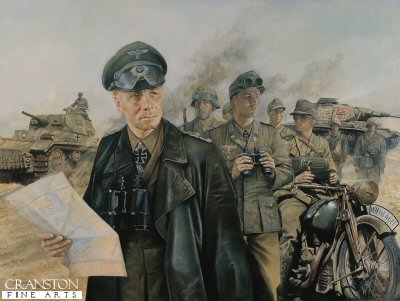
“The Germans were military geniuses!”
Down at the tactical level the Germans were genuinely very good. Right up to the end of the war their NCOs and junior officers were tactically sophisticated and capable of putting up a fierce fight. And up until the end of 1941, they enjoyed an incredibly unlikely string of successes. How unlikely? Let me put it this way. They were rolling dice against their opponents every day. They needed a 5 or better every time just to stay in the game. They consistently rolled 6’s, while no-one else was able to get more than a 3. And that went on for over two years. Unfortunately, despite their tactical ability, the war was being won or lost at an entirely different level. Rolling dice doesn’t help if you’re actually caught in a game of chess. And chess… well, let’s just say the Russians have a reputation for being good at it.
The Eastern Front was where the German armies were defeated, inflicting 80% of the casualties Germany suffered and tying up a similar proportion of their total military capacity. It wasn’t simply a matter of hurling bodies at them either; by the end of 1942 the Soviets had recovered from the shock of invasion and had got their best generals in the fight. Their operational technique was good enough to drive the German armies back to Berlin, and after WW2 the US borrowed much of it for their military doctrine. It was the same in other theatres too. German pilots were some of the highest-scoring aces of the war, but they died with their squadrons instead of teaching a new generation of pilots. The Kriegsmarine did their best to close the Atlantic and prevent convoys reaching Britain, but their best wasn’t good enough. The German forces were consistently outperformed at the operational and strategic levels. Even their star players – like Rommel in North Africa – had to perform under crippling shortages of practically every vital resource.
And this is the cold calculus that underlies all of WW2. Logistics matter, in a way that the wehraboos cannot afford to accept. To win a war you have to have enough weapons and people to use them, the supplies they need, and get all this where it’s needed in time to be useful. The Germans couldn’t do it. While the US Army was sending its best and brightest into the supply services and the British began the war with the only fully mechanised military in the world, a German infantry division had ten times as many horses as it did trucks. Taking on not one, not two, but three of the world’s largest military and industrial powers under those circumstances was not military genius, it was suicide.
Not that you’ll hear the wehraboos accept that, of course. They would prefer to think about how…

“The Germans could have invaded Britain!”
Operation Sealion might be the single most discussed action of WW2 that never took place. After Germany had taken over most of Western Europe and defeated France, it looked for sure as if Britain would be invaded next. Everyone started preparing for it – the British by building defences and taking down roadsigns, the Germans by beginning a bombing campaign and collecting barges. Hindsight makes the case even more compelling. Britain was the only major power still fighting the Germans, and was the only thing standing between Germany and complete domination of continental Europe. If the British could be defeated, Germany could turn its undivided attention East. The possibilities would be limitless! In fact, there was only one small issue – Operation Sealion was impossible.
I don’t propose to take the plan apart step by step. Other people have done that at length, far more comprehensively than I have space for here. I’ll just say that the German plan is far from certain to succeed even without taking into account enemy action. Although calling it a plan is a rather grandiose term for “collection of half-baked ideas, formed in isolation and distressingly far from reality”. Just to pluck a random example, the invasion force was to include four thousand horses in the first wave. No thought was given to how the horses would get off the barges, or what they would do once they were ashore. These barges – river barges without engines, by the way, not intended for use at sea – would have less than a single trained sailor on each one, and their movements would be coordinated by shouting. Let me stress again that I am not making this up; this was the German masterplan for the invasion of Britain. It was probably a huge relief for everyone involved when the whole idea was called off, since it would have been a clusterfuck of epic proportions even if we wave a magic wand and remove the entire British military from the scene.
Which reminds me…

If you want a picture of the future, imagine all the Allied characters of Hetalia derping furiously… forever.
“No-one could do anything about this!”
This is the real crux of all the other wehraboo fantasies. The Germans can develop different technologies, employ different strategies, conduct different operations – and no-one ever responds, assuming they even notice. The successful implementation of whatever scheme has come up invariably requires their opponents – no slouches historically – to be drinking paint thinners and hitting themselves on the heads with hammers. It is teeth-grindingly infuriating to see this time after exasperating time, but the people breathlessly explaining how the master-race will win seem unaware of the issue.
So let’s get it out in the open: nothing occurs in a vacuum. Everything has consequences, frequently unpredictable ones. The Western Allies started using radar to hunt U-boats; the Kriegsmarine started putting radar-detectors on their U-boats. The Germans build bunkers that can’t be penetrated by bombs; the British build bombs that explode underneath the target and drop it into a huge crater. And so it goes, action and reaction. Real-life doesn’t have to make sense, that’s why it’s frequently stranger than fiction and why there are examples of nations acting in mind-bogglingly stupid ways. But these are the exception, not the rule.
On the alternate-history forum I frequent, this is described as a wank (although given how often it happens more extreme terms might be appropriate). And if you are wanking Nazi Germany, I would like to point out that plausibility, to say nothing of good taste, is not on your side.
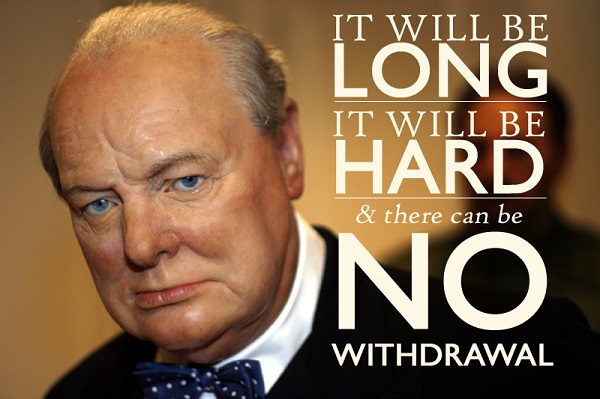
He was probably talking about the struggle against Nazi Germany. Probably.
There is no likelihood that this article will prevent wehraboos from being wehraboos, of course. The four horsemen of the wehrpocalypse cannot be stopped by an angry rant on a minor blog. Possibly nothing can stop them, and after the world ends one cockroach will turn to the other and start talking excitedly about how the Germans had stealth fighters during WW2. But we don’t have to give in to them either. And every time we swing our clue-bats at a marine pinniped as it lumbers and honks its way up the beach, we get a bit closer to a world free of wehraboos.
Question of the post: What subcultures of your interest areas make you angry? And why do they keep coming up?

Thank you for unpacking this issue. My son (Max – a smart joung genius such as yourself) and I often talk about WW2 tech and the various degrees of German hubris.
Also thx for the link to the Grand Panjandrum – something I knew nothing about.
You might find this interesting: https://medium.com/migration-issues/westeros-is-poorly-designed-3b01cf5cdcaf#.mjvrya8yc
LikeLiked by 1 person
Very interesting link. That sort of “by the numbers” approach to fictional works often leads to hilarious results for exactly the reasons we see in the article – most authors don’t care much about the implications of the details they sprinkle in to add flavour. It’s something I’m struggling to get better with in my writing, but it is very difficult.
As for WW2 tech, countless billions of pixels and pages have been expended on discussing those subjects, and I see no reason that will change in the next few decades. There is certainly plenty of room for argument. I just wish it was slightly better-informed argument, rather than breathless exclamations about this or that super-weapon. As we both know, weapons don’t win wars.
LikeLiked by 1 person
Thank you! This is the argument I’ve been making for years. You put it in a clear and sharp way.
And a lot of your arguments can be applied for other wars as well, from Napoleonic to Vietnam. Armchair Generals love to act like they are better at military than trained personnels.
A thing I want to add: a lot of people forget that wars are fought for POLITICAL purposes. Real life is not an RTS game. A leader always have to weight the pros and cons. There’s no point winning a war if you end up bankrupting your own empire. The US can drop nukes and kill everyone in Iraq, but they will gain nothing from it. Sad that so many people don’t understand this simple fact.
LikeLiked by 1 person
You’re welcome! And you’re absolutely right, there’s no shortage of other conflicts the same principles can be applied to.
The Clausewitzian principle you mention is well worth keeping in mind, as is its corollary – politics is a continuation of war by other means. That’s a rather uncomfortable thought sometimes, and especially now.
LikeLike
“Might have beens” are easy to do in hindsight and the odds on Germany winning in the long term were probably nil (the A-bomb would have finished them off anyway). When I found out that the Germans were heavily dependent on horse drawn equipment and artillery I was gobsmacked. Even in 1940 that was insane though to be honest it took almost a mutiny for the US to ditch the horse cavalry. Even then we wound up with a concept that depended on TDs and anti-tank artillery to counter tanks and didn’t develop or field heavy(er) tanks until the end of the war. You could do a whole article on how many times the allies won in spite of their screwups.
There is also the question of how much the “little corporal” managed to screw up the German war machine with his grandiose V-weapons and monsters like the Maus tank and interference with his generals over strategy and tactics. If Hitler had expended some of that effort on mechanized transport would that have increased his chances of taking Moscow? One show that I watched pointed out that the best thing that lend lease provided the Russians was not tanks nor artillery but trucks which not only allows rapid resupply of the troops but acted as the “horses” to move their artillery which gave them a decided advantage in being able to redeploy quickly both for the attack and defense. Could the Germans have taken Moscow if he’d let his generals do what they wanted? Would that have damaged the Soviet Union enough to prevent them from succeeding in their counter attacks? All speculation but interesting to conjecture about, at least for me.
Picking a fight with the US while fighting both Britain and Russia showed Hitler’s disassociation from reality. But then the Japanese wound up picking a fight with the US because they totally misread the American personality. Given that the German generals were well aware that they couldn’t win a two front war and, as you point out, they had no real hope of achieving operation Sea Lion, the obvious route was going to be to take out the middle east and gain the oil and block the Suez instead of trying for Russia and the Romanian oil fields. Of course that did not fit with Hitler’s desire for Lebenstraum. Even then the Germans wound up terrorizing the subject people in the areas they conquered rather than co-opting them to fight the Soviets who many hated. What if Zhukov had been pinned down dealing with an attack by the Japanese in the East (which some say Hitler was counting on)? Would that have changed things enough? The mistakes just keep piling up. Same sort of situation could be applied to SeaLion. If the Germans had prevented the evacuation from Dunkirk would England have been vulnerable enough for a airborne attack that would have allowed the Germans to capture airfields and ports (without the idiot barges) in southern England or would the Royal Air Force have been able to stop it? Once a lodgment was made on the island where German aircraft would have more loitering time over target the situation might have deteriorated. Thing is we’ll never know “because it didn’t happen”. AYS there is no way of knowing how the opponents would have reacted to any of the speculative scenarios.
Sorry about the TL:DR
LikeLiked by 1 person
Oh and for the Americans don’t forget the WWII bat bombs
LikeLiked by 1 person
Oh yes, there’s no shortage of weird projects out there. Project Habbakuk is one of my favourites – iceberg aircraft carrier? Don’t mind if I do!
LikeLike
I think you’re right with pretty much everything you say. The point about trucks being more valuable than tanks is a good one, though… maybe I should do a post about logistics sometime.
LikeLike
Thanks for the reply. A post on logistics would be interesting, especially since I think you’ve had some experience with the issue. Can’t fight without “beans and bullets”.
I’ve been reading a non-fiction book: The Engines of War which describes the effect the train has had on warfare. Not only did it allow for troops to readily be moved, but also their logistical necessities which allowed for larger armies to be fielded and concentrated because they were no longer dependent on living off the land. The author also delves into how they were used and misused by the armies as well as issues such as different rail gauges (if your gauge is different than an invaders it slows them down significantly).
Another example would be the allies problems with logistics in the ETO due to the lack of a port near their front. The Red Ball Express and Operation Pluto being two attempts to alleviate some of the problems. Even how you package things is important: the British petrol in “tin” containers vs the German “Jerrycans”. Hell, even the concept of combat loading a supply ship is important for supporting a attack.
LikeLiked by 1 person
Logistics is a really complex issue. As you point out, there’s no shortage of examples of how people have tried to approach it and even take advantage of that complexity. Doing a post on it would be a challenge, but I’ll see what I can come up with.
LikeLike
Pingback: 2017 Stats | Speculative OP